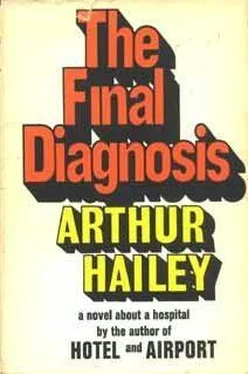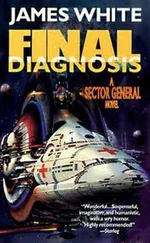Arthur Hailey - The Final Diagnosis
Здесь есть возможность читать онлайн «Arthur Hailey - The Final Diagnosis» весь текст электронной книги совершенно бесплатно (целиком полную версию без сокращений). В некоторых случаях можно слушать аудио, скачать через торрент в формате fb2 и присутствует краткое содержание. Жанр: Триллер, на английском языке. Описание произведения, (предисловие) а так же отзывы посетителей доступны на портале библиотеки ЛибКат.
- Название:The Final Diagnosis
- Автор:
- Жанр:
- Год:неизвестен
- ISBN:нет данных
- Рейтинг книги:4 / 5. Голосов: 1
-
Избранное:Добавить в избранное
- Отзывы:
-
Ваша оценка:
- 80
- 1
- 2
- 3
- 4
- 5
The Final Diagnosis: краткое содержание, описание и аннотация
Предлагаем к чтению аннотацию, описание, краткое содержание или предисловие (зависит от того, что написал сам автор книги «The Final Diagnosis»). Если вы не нашли необходимую информацию о книге — напишите в комментариях, мы постараемся отыскать её.
The Final Diagnosis — читать онлайн бесплатно полную книгу (весь текст) целиком
Ниже представлен текст книги, разбитый по страницам. Система сохранения места последней прочитанной страницы, позволяет с удобством читать онлайн бесплатно книгу «The Final Diagnosis», без необходимости каждый раз заново искать на чём Вы остановились. Поставьте закладку, и сможете в любой момент перейти на страницу, на которой закончили чтение.
Интервал:
Закладка:
“Did you remind him about it?”
“If I called him once I called him half a dozen times. He’d probably have been longer if I hadn’t kept after it.”
“And that’s why you kept Mrs. Bryan in—for three weeks?”
“Naturally.” The voice on the phone took on a note of sarcasm. “Or are you suggesting I should have discharged her?”
There was reason for Reubens to be sour on the subject, O’Donnell thought. Unquestionably he had been put in a difficult position. If he had discharged the patient, he might have had to call her back for more surgery, as had happened to Bill Rufus. On the other hand, every additional day in hospital meant an extra financial burden for the family. He answered noncommittally, “I’m not suggesting anything, Reub. Just making some inquiries.”
The thing had obviously been on Reubens’ mind. “Then you’d better talk to some of the other men,” he said. “I’m not the only one this has happened to. You know about Bill Rufus?”
“Yes, I know. Frankly, I thought things had been improving a little.”
“If they have, it’s not so’s you’d notice it. What do you propose to do about Bryan’s bill?”
“I doubt if we can do anything. After all, his wife was here for three weeks. Hospital money is tight, you know.” O’Donnell wondered what Reubens’ reaction would be when he heard he was being asked to give six thousand dollars himself to the hospital building fund.
“It’s too bad. Husband’s a decent little guy—a carpenter or something like that, works for himself. He didn’t have any insurance. This’ll set ’em back for a long time.” O’Donnell made no answer. His mind was already running ahead, thinking of what came next. Again the thin voice on the phone: “Well, is that all?”
“Yes, Reub; that’s all. Thanks.” He handed the telephone back to Harry Tomaselli.
“Harry, I want a meeting this afternoon.” O’Donnell had made up his mind what had to be done. “Let’s try to get half a dozen of the senior people on staff. We’ll meet here, if that’s convenient, and I’d like you to be here too.”
Tomaselli nodded. “Can do.”
O’Donnell was checking over names in his mind. “We’ll want Harvey Chandler, of course, as chief of medicine. Better have Bill Rufus, and Reubens should be included, I think.” He paused. “Oh yes, and Charlie Dornberger. He might be useful. How many is that?”
The administrator checked the names he had written. “Six with you and me. How about Lucy Grainger?”
Briefly O’Donnell hesitated. Then he said, “All right. Let’s make it seven then.”
“Agenda?” Tomaselli had his pencil poised.
O’Donnell shook his head. “We won’t need one. There’s just one subject—changes in Pathology.”
When the administrator had mentioned Lucy Grainger’s name, O’Donnell had hesitated for one reason only: it had reminded him of a meeting between himself and Lucy the night before.
They had met for dinner—the outcome of O’Donnell’s invitation to Lucy the day of the mortality conference—and in the Palm Court of the Roosevelt Hotel they had had cocktails, then a leisurely meal. It had been a pleasant, relaxed occasion, and they had talked lightly of themselves, of people they had known, and their own experiences in and out of medicine.
Afterward O’Donnell had driven Lucy home. She had recently moved into Benvenuto Grange, a large, fashionable apartment block on the north side of town. She had said, “You’ll come in for a nightcap, of course?”
He had left his car for the uniformed doorman to park and followed her. They rode the gleaming, silent elevator to the fifth floor, then turned down a birch-paneled corridor, their footsteps silenced in deep broadloom. He had raised his eyebrows and Lucy smiled. “It is a little awesome, isn’t it? I’m still impressed myself.”
She had used her key to open a door and inside touched a switch. Tasteful, subdued lighting sprang up around an elegant interior lounge. He could see the partly opened door of a bedroom directly ahead. “I’ll mix us a drink,” she said.
Her back was to him. Ice clinked in glasses. O’Donnell said, “Lucy, you’ve never married?”
“No.” She had answered without turning.
He said softly, “I’ve sometimes wondered why.”
“It’s very simple really. It’s quite some time since I was asked.” Lucy turned, carrying the drinks she had mixed. She gave O’Donnell his, then moved to a chair. She said thoughtfully, “Now I think of it, there was only one occasion—at least, only one that mattered. I was a good deal younger then.”
O’Donnell sipped his drink. “And your answer was ‘no’?”
“I wanted a career in medicine. At the time it seemed terribly important. That and marriage didn’t seem to go together.”
He asked casually, “Any regrets?”
Lucy considered. “Not really, I suppose. I’ve achieved what I wanted, and it’s been rewarding in many ways. Oh, sometimes one wonders how things would have turned out with a different decision, but after all, that’s human, isn’t it?”
“I suppose so.” O’Donnell was conscious of being strangely moved. There was a sense of depth and tenderness about Lucy, a feeling of peacefulness and coming home. She should have children, he thought. He had asked, “Do you still feel the same way about marriage and medicine—for you, that is?”
“I’m no longer dogmatic about anything.” She smiled. “That, at least, I’ve learned.”
O’Donnell wondered what, from his own point of view, marriage to Lucy would be like. Would there be love and mellowness? Or had each of their careers gone parallel too far and too long for change and adjustment now. If married, how might they spend their hours of leisure? Would the talk be intimate and domestic? Or would it be of hospital affairs, with charts on the table at dinner and diagnostic problems for dessert? Would he perhaps, instead of gaining sanctuary, find merely another offshoot of medicine and his daily work. Aloud he said, “I’ve always thought, you know, that we have a good deal in common.”
“Yes, Kent,” Lucy answered, “so have I.”
O’Donnell had finished his drink, then risen to leave. He realized they had both said a good deal more than had passed in words. Now he wanted time to think and to reason things through. Too much was involved for hasty decisions.
“There’s really no need to go, Kent. Stay if you wish.” Lucy had said it simply, and he knew if he stayed it would be up to him what happened next.
Part of his mind had told him to remain, but caution and habit won out. He took her hands. “Good night, Lucy. Let’s think about all this.”
When the elevator doors had closed she was still standing at the open apartment door.
Six
“I asked you here,” O’Donnell told the group around the board-room table, “because I’d like your support in something I want to do.” The others were listening attentively. Of those they had asked, all had come except Reubens, who had a herniorrhaphy scheduled. O’Donnell went on, “I think we all know there’s a problem in Pathology. I believe, too, you’ll agree it’s a personal problem as well as medical.”
“What kind of a problem?” It was Charlie Dornberger. As the elderly obstetrician talked he filled his pipe. “I’m not sure I know what you’re getting at, Kent.”
O’Donnell had expected something like this. He knew that Dornberger and Pearson were close friends. Politely he said, “I’d like you to hear me out, Charlie, if you will. I’ll try to make it clear.”
Methodically he went over the issues involved—the delays in surgical reports, the increasing service the hospital required from its pathology department, his own doubts that Joe Pearson could cope with them alone. He related the incident of Bill Rufus’ patient, turning to Rufus for confirmation, and followed it with the report he had had from Reubens that morning. He told them of his own interview with Pearson and the old man’s refusal to accept a second pathologist. He concluded: “I’m convinced we do need a new man to help Joe out. I want your support in seeing that one is brought in.”
Читать дальшеИнтервал:
Закладка:
Похожие книги на «The Final Diagnosis»
Представляем Вашему вниманию похожие книги на «The Final Diagnosis» списком для выбора. Мы отобрали схожую по названию и смыслу литературу в надежде предоставить читателям больше вариантов отыскать новые, интересные, ещё непрочитанные произведения.
Обсуждение, отзывы о книге «The Final Diagnosis» и просто собственные мнения читателей. Оставьте ваши комментарии, напишите, что Вы думаете о произведении, его смысле или главных героях. Укажите что конкретно понравилось, а что нет, и почему Вы так считаете.












